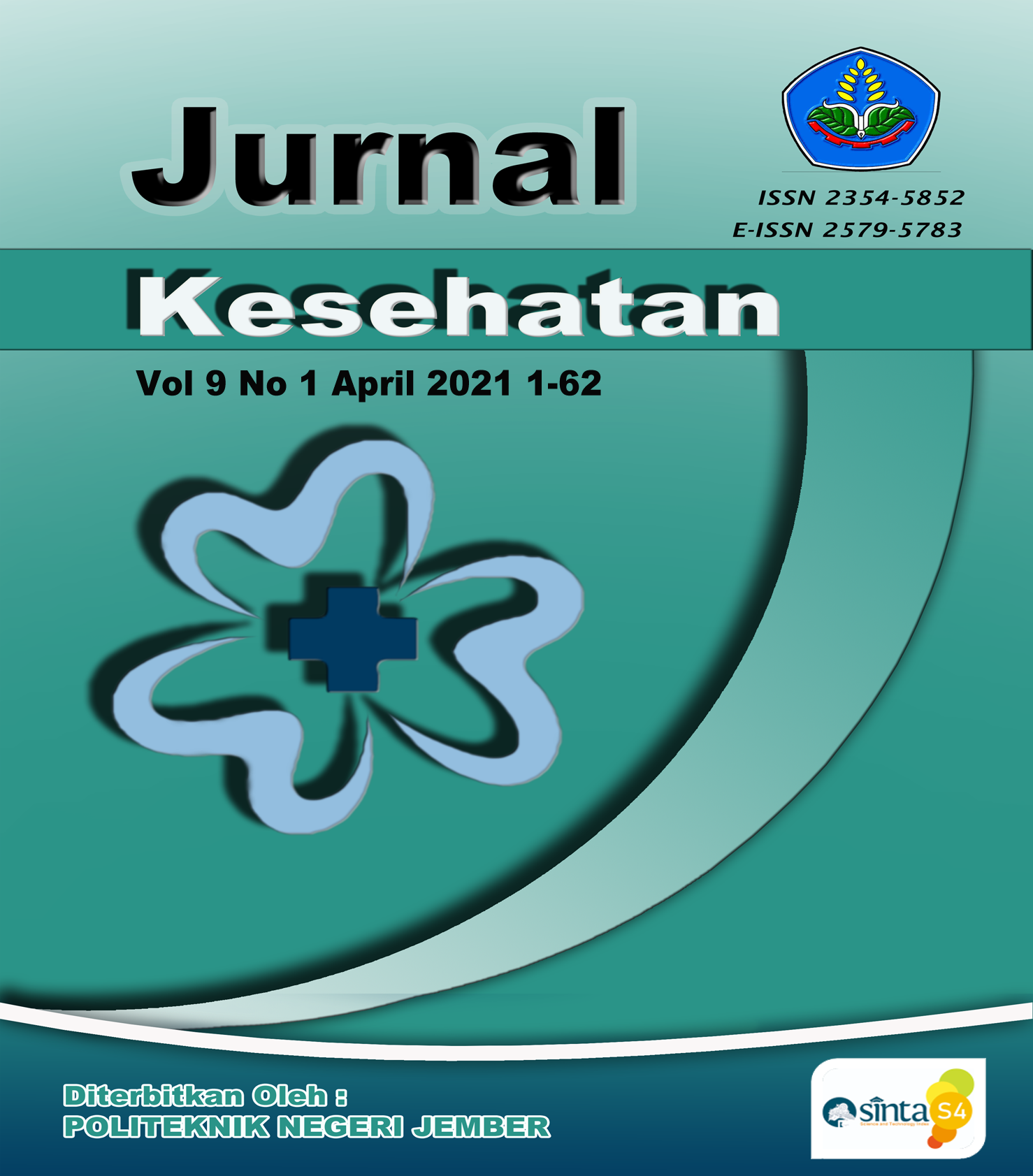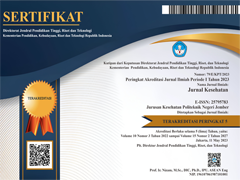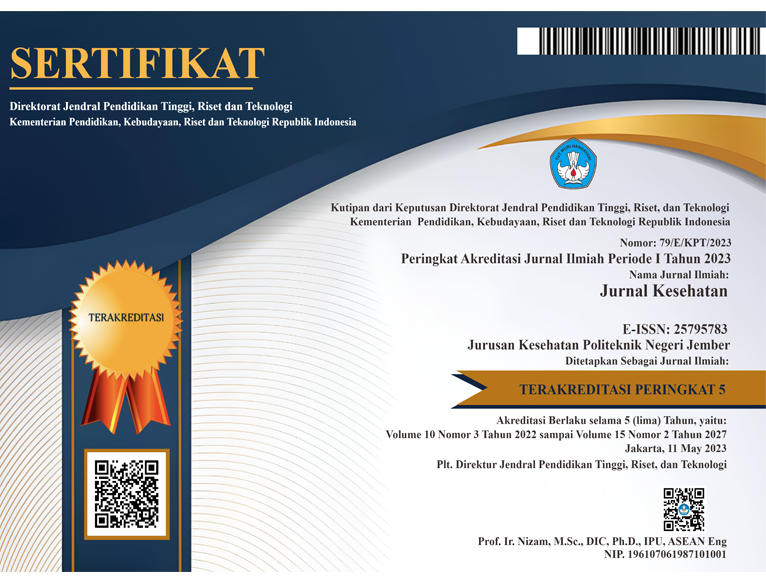
Hubungan Perilaku Hidup Sehat Orang Tua dan Literasi Kartu Menuju Sehat (KMS) terhadap Tumbuh Kembang Balita
DOI:
10.25047/jkes.v9i1.207Downloads
Abstract
The growth and development status of children was been seen from nutritional status and
cognitive and psychomotor aspects of children aged 0 to 5 years and child will automatically
follow behaviour of their parent’s lives. Aside from being a source of child health
information, in the KMS book there was also information on children's weight and height
graphic data obtained from the Posyandu scales. To determine the influence of healthy living
behaviors of parents and KMS book, literacy towards the growth and development status of
babies-toddlers. The study design was correlative with the type of cross-sectional study, the
the sample was 49 respondents, data collection techniques used healthy life behavior
questionnaires and KMS book literacy and observations and records from the results of
measurements of growth and development status of infants-toddlers in January 2020, and
data analysis using Pearson Correlation test. The healthy behavior of parents and KMS book
literacy influenced the growth and development status babies-toddlers. The cognitive aspects
of the community were able to read the KMS chart and find out the meaning of the KMS
chart to monitor the weight and nutritional status of babies-toddlers. In the psychomotor
aspect, people began to realize the importance of giving breast milk for >6 months and
cooking their own food. The suggestion was need for more intensive mentoring to Posyandu
administrators to increase KMS literacy and be able to teach it to all families.
Keywords:
growth and development status of toddlers, healthy behavior of parents, KMS book literacyReferences
Aidid, M. K., Sulaiman and Side, S. (2017) ‘Pengaruh Pemberian Pola Makanan Sehat Terhadap Status Gizi Anak Anak Didik TK Bunga Asya’, Scientific Pinisi, 3(April), pp. 17–26.
Al-Rahmad, A. H. and Fadillah, I. (2016) ‘Perkembangan Psikomotorik Bayi 6 – 9 Bulan berdasarkan Pemberian ASI Eksklusif’, AcTion: Aceh Nutrition Journal, 1(2), p. 99. doi: 10.30867/action.v1i2.18.
Alamsyah, D., Mexitalia, M. and Margawati, A. (2015) ‘Beberapa Faktor Risiko Gizi Kurang’, Jurnal Vokasi Kesehatan, 1(5), pp. 131–135. doi: 10.1016/j.addr.2018.07.010.
Amaliah, N., Sari, K. and Suryaputri, I. Y. (2016) ‘Panjang Badan Lahir Pendek Sebagai Salah Satu Faktor Determinan Keterlambatan Tumbuh Kembang Anak Usia 6-23 Bulan Di Kelurahan Jaticempaka, Kecamatan Pondok Gede, Kota Bekasi’, Jurnal Ekologi Kesehatan, 15(1), pp. 3–9. doi: 10.22435/jek.v15i1.4959.43-55.
Aridiyah, F. O., Rohmawati, N. and Ririanty, M. (2015) ‘Faktor-faktor yang Mempengaruhi Kejadian Stunting pada Anak Balita di Wilayah pesedaan dan perkotaan’, 3(1), pp. 164–170. doi: 10.1007/s11746-013-2339-4.
Fadila, R. N., Amareta, D. I. and Febriyatna, A. (2019) ‘Hubungan Pengetahuan Dan Perilaku Ibu Tentang Gizi Seimbang Dengan Status Gizi Anak Tk Di DesaYosowilangun Lor Kabupaten Lumajang’, Jurnal Kesehatan, 5(1), pp. 14–20. doi: 10.25047/j-kes.v5i1.26.
Hariyadi, D. (2016) ‘Asupan Suplemen Bukan Determinan Kejadian Stunting Anak Balita (1-3 Tahun)’, Jurnal Vokasi Kesehatan, 2(2), pp. 108–112. Available at: https://doaj.org/article/0142ddaf81ae470c8e0e721f21606800.
Komariah, N., Farid, F. and Effendi, S. H. (2017) ‘Faktor-Faktor yang Berhubungan dengan Kemampuan Sosialisasi Anak’, Sari Pediatri, 18(5), p. 373. doi: 10.14238/sp18.5.2017.373-8.
Kusuma, R. M. (2019) ‘Hubungan Status Gizi dengan Perkembangan Anak Umur 24-60 Bulan di Kelurahan Bener Kota Yogyakarta’, Jurnal Kesehatan Vokasional, 4(3), p. 122. doi: 10.22146/jkesvo.46795.
Kusuma, R. M. and Hasanah, R. A. (2018) ‘Antropometri Pengukuran Status Gizi Anak Usia 24-60 Bulan Di Kelurahan Bener Kota Yogyakarta’, Medika Respati : Jurnal Ilmiah Kesehatan, 13(4). doi: 10.35842/mr.v13i4.196.
Liliana and Absari, D. T. (2018) ‘Pemanfaatan Teknologi Informasi Dalam Mendukung Posyandu Terkait Dengan Tumbuh Kembang Anak’, Teknika, 7(2), pp. 122–128. Available at: http://ejournal.ikado.ac.id/index.php/teknika/article/view/133.
Maimon, E., Ismail, D. and Sitaresmi, M. N. (2016) ‘Hubungan Mengikuti Kelompok Bermain dan Perkembangan Anak’, Sari Pediatri, 15(4), p. 232. doi: 10.14238/sp15.4.2013.232-6.
Masita, M., Biswan, M. and Puspita, E. (2018) ‘Pola Asuh Ibu dan Status Gizi Balita’, Quality : Jurnal Kesehatan, 12(2), pp. 23–32. doi: 10.36082/qjk.v12i2.44.
Mayasari, E. and dkk (2019) ‘Pendidikan Kesehatan kepada Orang Tua untuk Pencegahan Penyakit ISPA pada Anak’, Journal of Community Engagement in Health, 2(1), pp. 13–16. doi: 10.30994/jceh.v2i1.13.
Muflihatin, I., Purnasari, G. and Swari, S. (2019) ‘Analisis perkembangan motorik kasar ditinjau dari status gizi berdasarkan WHO di TK Bayangkara Polres Jember’, Jurnal Kesehatan, 6(1), pp. 13–17. doi: 10.25047/j-kes.v6i1.41.
Munawaroh, S. (2015) ‘Pola Asuh Mempengaruhi Status Gizi Balita Relationship of Parenting Pattern and Toddlers’ Nutrititional Status’, Jurnal Keperawatan, 6(1), p. 138097.
Ni’mah, K. and Nadhiroh, S. R. (2010) ‘Faktor Yang Berhubungan Dengan Kejadian Stunting Pada Balita’, Media Gizi Indonesia, 1, pp. 13–19.
Nugraheni, S. . et al. (2018) ‘Peningkatan Praktik Mandiri Ibu dalam Pemantauan Status Gizi Balita melalui Pendampingan Aktivitis Dasa Wisma’, Media Kesehatan Masyarakat Indonesia, 14(4), p. 418. doi: 10.30597/mkmi.v14i4.5233.
Olsa, E. D., Sulastri, D. and Anas, E. (2017) ‘Hubungan Sikap dan Pengetahuan Ibu Terhadap Kejadian Stunting pada Anak Baru Masuk Sekolah Dasar di Kecamanatan Nanggalo’, Jurnal Kesehatan Andalas, 6(3), pp. 523–529. Available at: http://jurnal.fk.unand.ac.id/index.php/jka/article/view/733.
Pantaleon, M. G., Hadi, H. and Gamayanti, I. L. (2016) ‘Stunting berhubungan dengan perkembangan motorik anak di Kecamatan Sedayu, Bantul, Yogyakarta’, Jurnal Gizi dan Dietetik Indonesia (Indonesian Journal of Nutrition and Dietetics), 3(1), p. 10. doi: 10.21927/ijnd.2015.3(1).10-21.
Rachmi, C. N. et al. (2016) ‘Stunting, Underweight and Overweight in Children Aged 2.0–4.9 Years in Indonesia: Prevalence Trends and Associated Risk Factors’, PLOS ONE. Public Library of Science, 11(5), pp. 1–17. doi: 10.1371/journal.pone.0154756.
Rahayu, A. P., Dharmawan, Y. and Nugroho, D. (2018) ‘Hubungan Karakteristik Ibu Balita Dengan Pemanfaatan Data Kartu Menuju Sehat (KMS) Dalam Buku KIA (Studi Kasus Puskesmas Kedungmundu Kota Semarang Tahun 2016)’, Jurnal Kesehatan Masyarakat, 6(1), pp. 103–109. doi: 10.1017/CBO9781107415324.004.
Rahmad, A. H. Al (2017) ‘Pemberian Asi Dan MP-ASI Terhadap Pertumbuhan Bayi Usia 6-24 Bulan’, Jurnal Kedokteran Syiah Kuala, 17(1), pp. 8–14.
Rahmad, A. H. Al (2018) ‘Modul Pendamping KMS Sebagai Sarana Ibu Untuk Memantau Pertumbuhan Balita’, Jurnal AcTion: Aceh Nutrition Journal, 3(1), pp. 28–33. doi: 10.30867/action.v3i1.9.
Saepuddin, E., Rizal, E. and Rusmana, A. (2018) ‘Posyandu Roles as Mothers and Child Health Information Center’, Record and Library Journal, 3(2), p. 201. doi: 10.20473/rlj.v3-i2.2017.201-208.
Sari, M. R. N. and Ratnawati, L. Y. (2018) ‘Hubungan Pengetahuan Ibu tentang Pola Pemberian Makan dengan Status Gizi Balita di Wilayah Kerja Puskesmas Gapura Kabupaten Sumenep’, Amerta Nutrition, 2(2), pp. 182–188. doi: 10.20473/amnt.v2.i2.2018.182-188.
Suzanna, S., Budiastutik, I. and Marlenywati, M. (2017) ‘Analisis Faktor Yang Berhubungan Dengan Status Gizi Anak Usia 6-59 Bulan’, Jurnal Vokasi Kesehatan, 3(1), p. 35. doi: 10.30602/jvk.v3i1.103.
Tristanti, I. and Risnawati, I. (2017) ‘Motivasi Kader Dan Kelengkapan Pengisian Kartu Menuju Sehat Balita Di Kabupaten Kudus’, Indonesia Jurnal Kebidanan, 1(1), p. 1. doi: 10.26751/ijb.v1i1.221.
Uliyanti, Tamtomo, D. . and Anantanyu, S. (2017) ‘Faktor Yang Berhubungan Dengan Kejadian Stunting Pada Balita Usia 24-59 Bulan’, Jurnal Vokasi Kesehatan, 3(2), pp. 1–11.
License
Copyright (c) 2021 Jurnal Kesehatan

This work is licensed under a Creative Commons Attribution-ShareAlike 4.0 International License.
Authors who publish in this journal agree to the following terms:
1. Copyright belongs to the medical journal as a publication
2. The author retains copyright and grants the journal rights to the first publication carried out simultaneously under a Creative Commons Attribution License which allows others to share the work with an acknowledgment of the author's work and initial publication in this journal.
3. Authors may enter into separate additional contractual arrangements for the non-exclusive distribution of the work (eg sending it to an institutional repository or publishing it in a book) with acknowledgment of initial publication in this journal.
4. Authors are permitted and encouraged to post work online (eg in institutional repositories or on their websites) before and during the submission process, as before and larger citations of published work (see Effects of Open Access).
Selengkapnya tentang teks sumber ini













